2nd - 6th January 2012, The final run to Jakarta
Ciapanas - Bandung – Purwakarta – Cikarang – Jakarta
Total distance: 1527 – 1800km
 It was evident that cycling five days back to back was too much for us. Within an hour of leaving our hotel in Ciapanas Liv was suffering from the same kind of exhaustion that had clobbered me a few days before - tiring quickly on uphill stretches, and getting hit by occasional bouts of dizziness. Based on previous experience it seems that if we overdo it on the bikes, aside from the immediate, obvious effects of exhaustion, the very next day my energy levels get zapped, and I don't regain them for a day or two, whereas Liv is usually fine, but then has the ill effects jump her a few days down the line. We have no idea why this happens, and we're not sure which is the more preferable – being whacked by fatigue immediately, but getting it over and done with quickly, or having fair warning that in a couple of days your body is going to be conked for a bit.
It was evident that cycling five days back to back was too much for us. Within an hour of leaving our hotel in Ciapanas Liv was suffering from the same kind of exhaustion that had clobbered me a few days before - tiring quickly on uphill stretches, and getting hit by occasional bouts of dizziness. Based on previous experience it seems that if we overdo it on the bikes, aside from the immediate, obvious effects of exhaustion, the very next day my energy levels get zapped, and I don't regain them for a day or two, whereas Liv is usually fine, but then has the ill effects jump her a few days down the line. We have no idea why this happens, and we're not sure which is the more preferable – being whacked by fatigue immediately, but getting it over and done with quickly, or having fair warning that in a couple of days your body is going to be conked for a bit. 
The road was easy on us to start with though – somewhat hilly, but gently sloped, and the surface was very smooth since we appeared to be on a newly constructed highway. It was so new in fact that it wasn't even on our map, and all three lanes of it were quiet as we slowly pedalled our way past the tellie-tubbie green hills. By midday the road began to descend and we were treated to a rapid down hill run along sweeping curves with green valley views, but at the next junction the inevitable traffic came: clumsy, thick and claustrophobic. Western Java really has the edge on bad traffic, it's the worst we've experienced so far. Cars cut across us at speed, motorbikes come straight at us the wrong way down the highway, and we're constantly being honked at by people's horns - so loudly and sometimes so suddenly that we flinch as though we've just been punched in the kidneys. At traffic lights the madness gets compressed into a dense, rumbling, smoky cauldron of exhausts and bad manners. When the lights are red we spend a minute or two stood still, surrounded on all sides by vehicles spitting fumes, with motorcyclists pushing past us to fill a few inches gap up the line. As soon as the lights change though everyone starts hammering their horns wildly, as if failure to do so would result in a total traffic standstill. It drives us bonkers, especially when cars, trucks and bikes are cutting in front of us, knocking into our panniers, and asking us “Where is your country” at the same time. A good antidote for it, we've found, is to just start ringing our bells like three year olds and howling Brian Blessed style battle cries before pulling off. Yarrrrrgh!
 |
| Leaving Bandung via a market |
So, the road in to Bandung was grim and grey and packed with badly behaved traffic, and we couldn't even manage to take a break successfully. Every time we stopped for a drink or a snack some people strolled over, sat next to us, and began asking us the same three questions again and again (where are we from? where have we been? where are we going?) or started begging, forcing us to move on. We became desperate to get into the city and find a place to stay, just to get a moments peace! Unfortunately for us Ciapanas had been completely devoid of internet cafes, so we had not had the opportunity to find out where we could stay in Bandung. So after hours of almost non-stop, aggravating, dangerous cycling to get within the city limits, we spent just as long cruising aimlessly around the city trying to find somewhere to rest our frazzled heads.
After a couple of hours, some hasty internetting, and a few false hopes (too expensive, too many stairs to carry the bikes up) we finally found a place; a cheap third floor room in a kareoke bar, which was actually not as bad as it sounds. Liv was completely annihilated and got into bed for an early evening siesta, and I went out to find the local internet cafe to try to sort out the last few weeks of our neglected blog. The nearest one turned out to be a thirty minute walk away, so by the time I got there and uploaded some of the photos it was time to leave, so I packed up and walked back, woke Liv, and we both went out for an Indian down the road. Cities may well be overpopulated, noisy and dirty, but they do serve good food.
We enjoyed breakfast the next morning with some intrepid travellers from the States and Hong Kong; a couple who were working as models in Jakarta but had taken a few days off to explore the area. It was lovely to meet some fellow travellers that we could have a long conversation with – such opportunities are rare, and the two of them were very nice, although they did warn us that Jakarta was even noisier, dirtier and busier than Bandung, and apparently swarming with mosquitoes too. Great.
Jakarta lies about 200km from Bandung, along a smear of long grey roads packed with traffic. We spent the next few days sucking on exhausts, and pedalling through uninspiring soot coated towns, taking a day off in a hotel in an industrial estate that overlooked a fish farm.
 |
| Here is the toll road, notice the hills around it. |
We were actually quite lucky to find the fish farm view accommodation.
It took us hours to get out of Bandung the morning after our Indian dinner. The main route into and out of town was a wide toll road that bicycles were strictly forbidden from riding on, so in order to escape we had to find an alternative route and navigate a confusing mess of pot holed streets that led under bridges, through market places and down alley ways. The latter half of the morning and the whole afternoon was then spent riding up and down a roller-coaster of windy hilly lanes out in the country that danced around and under the toll road, held up on large concrete supports, that just ran straight and flat above us. It taunted us no end, seeing this dream highway held out of reach from us as we pedalled up hills, while monsoon clouds gathered above us, and then rained. We kept our spirits high though because we were looking forward to spending a day off at the lake resort that was marked a little further ahead on our map.
A lake resort.
We imagined it might be something like Pacitan had been: quiet, cheap, and a good place to take a day off (especially if you like Elton John) and on our approach it seemed likely that at least the first two of our expectations would be met. You see, the lake in question was trying fill a lot of roles, and some of those roles were severely at odds with it being a lake resort. Not only was it populated by a great expanse of fish farms at its centre, and not only was it the site of a lake resort, but it was also the site of dozens of factories that lined up along the shoreline like huge cuboid wildebeests drinking at the water. Surely nobody would want to spend a lot of money to stay at a resort situated right by a polystyrene factory. Right?
 |
| The view from our hotel |
Wrong. The resort was making the most of the local populace's desperation to escape the chaos of the cities, and the prices were set higher even than Ciapanas at New Year. We couldn't afford to spend that much again - $50 a night! After several tediously repetitive conversations with security guards at the resort (“Is there a hotel around here?” “There.” “We've just tried there, it's too expensive, is there another hotel around here?” “There.” “No, that's the same one. Too expensive. Is there another hotel?” “There.” “That's the one we've just been to, it's too expensive. Different hotel?” “There.” “That's the same one.”) we finally got a tip off about a cheaper one some five kilometres down the road. It had only been two days of cycling since our string of days off at New Year, but we were both physically and mentally knackered already. Busy roads wear us out quickly, and the five day push the week previous was still having an impact on our energy levels. In short, we were shattered.
Following the lead we'd been given we found ourselves riding through the heart of an industrial estate with huge gated compounds with mighty cooling towers shooting up hundreds of feet into the air. Just as it got dark we found our hotel, tucked away between some barbed wire fencing and a plastic manufacturing plant. It wasn't the cheapest in the world - about $20, but it wasn't bad; the staff were really nice, and the room was the biggest we'd had the whole time since being in Indo. The view was pretty rare as well, looking down from a hillside onto the southern edge of the lake and an aquatic city of fish farms spread out in the middle, all watched over by tall hills spilling waterfalls down themselves. It was great, and our day off should have been a corker, but the area was sorely lacking in food options, and the one place we did find was heinously expensive, and then we spent the whole afternoon in an internet cafe populated by loud crying children while we tried to get the blog up to date.
 |
| Fish farms |
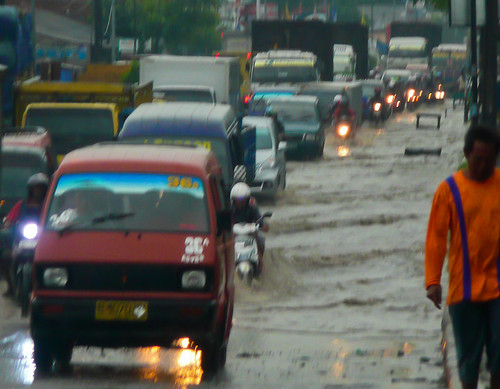 |
| Floods in Ciapanas |
Some time after that, maybe half an hour, we found a nice hotel with a ground floor room and set about showering ourselves of the dirty flood water that covered us head to toe. It must be said though, they served excellent food at this place, and we enjoyed some of the best Indonesian food this side of the Bali strait.
There's a few funny little things about Indonesia that we've noticed during our time here. We love the fact that at busy traffic lights they don't just show red amber green, but actually have a little count down for each of them. So you arrive at a red light, glance up and see that you have 29 seconds left to wait, and counting. In rural areas everybody waits until it reaches zero, the lights turn green, and then they pull off. In Surabaya everybody starts honking and moving forward when there's still 5 seconds left on the clock, and the impatient Jakartans are speeding off when there's still 10 seconds left on red. The worst thing about this is that, stuck in the middle of all these crazy drivers, we have to join them!
Another funny little thing is the way that waiters at restaurants come over to us expecting our order as soon as we've sat down and opened the menu, and they are reluctant to leave until they get it. Indonesians must be pretty sure about what they want before they go out for a meal. To deal with this we start by ordering drinks and they sometimes go away while we muse over the main courses, but more often than not they insist on standing there the whole time, pen poised over paper. Choosing food can take a long time when we have to translate our way through a large menu written in Indonesian, so we always try to tell them to give us time to decide. Our phrasebook recommends “Sebentar lagi” which means “One moment, please.” We tried that one with the waiter at our table on the night of the flooding, but he just nodded and stayed there until his boss, who had overheard us, came over and dragged him away.

What we needed was a simple phrase that we could remember that would get the message across. I looked up the Indonesian for “minute” which is “menit” - a pretty easy word to remember, and combined with our elite counting-to-ten skills we could use it to say “five minutes”. Would we like to order food? Five minutes. Perfect.
It happened the next morning at breakfast, of course. We sat down, a young woman appeared, we ordered coffee, “You want food?”, “Erm, yes, sebentar lagi. Just coffee now please.” She nodded, but stayed rooted to the spot. As we slowly perused the menu I remembered the saviour phrase. Wearing a proud grin I turned to her and held up an open hand “Lima menit.” There was a pause. Then she nodded and wrote “5 menit” on our order and continued to stand there.
 It took about two minutes just to get her to leave, but after much encouragement she finally clicked and left us alone to choose. We still haven't figured out a phrase for “Please give us a few minutes to decide.”, although I have real regrets about the fact that we didn't leave our order as “Two coffees and five minutes” just to see what we would have got.
It took about two minutes just to get her to leave, but after much encouragement she finally clicked and left us alone to choose. We still haven't figured out a phrase for “Please give us a few minutes to decide.”, although I have real regrets about the fact that we didn't leave our order as “Two coffees and five minutes” just to see what we would have got.Although still quite tired and nervous about the cycling conditions ahead of us, we were in very good spirits that morning - our last day of cycling in Java. The first leg of our trip was nearly over. We were within a few hours of central Jakarta, and we had a little map and some hostel recommendations in our pockets after a late night foray into a warnet in Cikarang the night before.
It rained hard that morning, but the traffic once we got into Jakarta was not as bad as we'd feared – actually quite a bit better than the previous few days; less of it on better roads. They were still enamoured by their horns though, the noisy bunch.
6th- 10th January 2012, Jakarta city break
Any self respecting backpacker who comes to Jakarta will get themselves to the centre of all things backpackery; Jalan Jaksa (Jalan is Indonesian for “Street” or “Road”). Jl. Jaksa was not quite as simple to find as we'd have thought though, it was a minor one way street that had bloomed into a forest of hotel signs, cafes, and travel agents. It's not huge, only five hundred metres long, and the tourism influence wanes almost as soon as you venture off this main minor road. For accomodation there are a run of hotels, some fairly new, shiny and quite expensive ($30-50 per night), but also a pleasing number of cheaper options, that offer basic rooms (bed, walls, floor, fan) for less than $10.
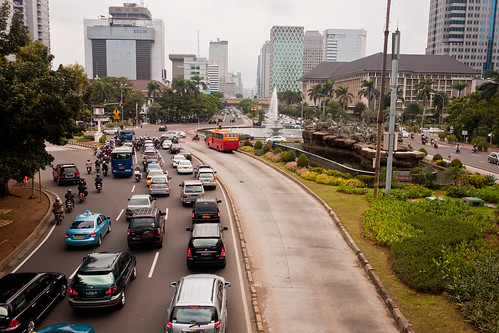 |
| Jakarta |
Starting out on this adventure we had plenty of things to worry about – fitness, food, malaria, leopards etc. - and we made the decision to find our feet before worrying about other things, like money. As a result we've been spending our money without thinking about it. Well, now we've got our heads at least partially around this whole long distance cycling malarky, so we're going to notch things up a bit add the extra challenge of a daily budget - keeping our combined expenses below $25 in cities, and $20 outside, starting in Jakarta. We want to start camping too, something we've managed to avoid entirely in Indonesia, but... one step at a time, and not in the middle of a city.
Like good price conscious consumers we took the cheap option on accommodation – the strangely named Bloem Steen Hostel. It sounded more like a cartoon action kettle voiced by Schwarzenegger than a place to call home for a few nights, but it was nice. The room was extremely basic, like I say, but the staff were great, especially a round faced guy by the name of Moonay who joked around with us, and always had a very broad smile that mirrored his big black drooping moustache. He thought it was amazing that we had got our bikes for $50 in Australia because you couldn't get a mountain bike in Jakarta for anything less than $100. It became an ongoing joke that he wanted to buy them off us for the same price, and sell them on in the city for a profit. A great deal in principle we said, but unfortunately we kinda needed them.
The first few evenings were spent with a lovely Dutch couple who were avoiding the winter back home, and an American who was teaching English in Japan. The five of us went out to eat at the restaurants, and wound up drinking copious amounts of Bintang before returning to the hostel, and sitting around noisily discussing the biggest rats we'd ever seen, and guzzling more beer. Needless to say, the first couple of nights we went over our new daily budget.
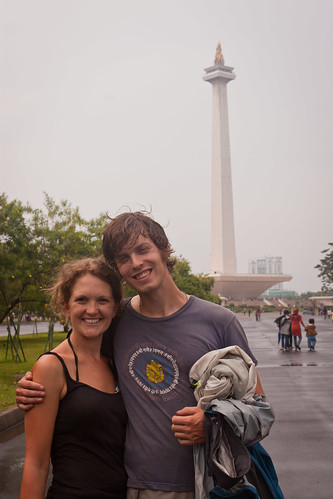 |
| Here we are in front of the National Monument |
We ended up spending four nights in Jakarta, and we found time amidst our lively evenings to explore the market, visit the mosque, the national monument of independence, and the museum. We liked Jakarta, it was certainly much more roomy and less intense than other cities we'd been through. People were generally used to seeing white people wandering around as well, so there was less of a hassle factor, although we were still pestered occasionally by people wanting to take photos of us, for reasons we cannot fathom.
Before we went waltzing off around monuments and museums, and even before we cracked the first bottle of BT, we urgently wanted to find out the news of the ferry that would take us to Malaysia. We had read that one left every Wednesday to an island just off Malaysia called Bintan (almost like the beer), and from there we could catch another short ferry ride to make the final jump to Malaysia. The problem was that this information was years old off an internet forum, and we had been unable to verify it anywhere. We asked a travel agent in Yogyakarta, but they couldn't tell us, and we spent some time googling but each time all we came up with were some blogs describing safe passage several years ago, some internet forums saying the ferry still ran, others saying the route had been cancelled. We got some encouragement after finally translating the ferry operator's website. This finally gave us a schedule but only of how the boats had run in the recent past, nothing for the weeks ahead. It did, however, show that CM Lambelu did indeed set sail from Jakarta to Bintan last Monday. So it still runs! All we had to do was find out when it left again, and book a ticket.
So this is the situation in which we found ourselves on the afternoon that we arrived in Jakarta, confident that we could get a ferry before our visas ran out, but none the wiser about where we could get tickets, or when the ferry ran – was it Monday, Wednesday or another day? Fortunately Jalan Jaksa is chocker with travel agents proudly offering information and bookings for tickets and tours, so we headed out straight away to try and get everything sorted. Unfortunately the travel agents on Jalan Jaksa are about the worst travel agents in the entire world, and what followed was a Kafkaesque nightmare played out over the course of long hours under the grey monsoon skies of the city.
Franz Kafka
The Ticket
A little bell clanged once, then silenced itself as we pushed open the door. It was plastered with airline stickers and the sign outside proudly announced that inside they offered free travel information. A starey eyed, black haired woman sat at a desk and looked up, we began to speak but she cut us off by pointing her pen to another doorway on our left, then sat back down to continue her work. We thanked her, and wandered through the doorway and came into another large room with a big glass panelled table with a map of Europe beneath it. Banners hung on metal stands offering tours, although the quality of the printing made it difficult to discern the details of each of the offers, because it was so pixellated, and because black on purple is not a readable colour scheme. A tiny woman with a sharp nose sat on a swivel chair on the other side of the map-of-Europe-table, she was transfixed by the monitor on her computer and didn't turn to look at us. We waited a moment, then decided that perhaps we should just start talking.
“Hi, we're trying to get some information about getting a boat to Malaysia.”
“Can't be done.” she said in a voice that was curt, but loaded with disdain. She still didn't bother to turn to look at us.
“Well yes but we know that there's a PELNI boat that-”
“PELNI don't do international crossings.”
PELNI, for the uninitiated, is the shipping line in Indonesia. It's popular in Indonesia because they run dozens of routes between the islands in the archipelago, and also because they sink much less frequently than the other lines, and have advanced safety features, like life boats, on board.
 |
| This is the largest mosque in South East Asia, its also probably the most bleak looking. |
“Yes, but they do have a route to Bintan.”
“Batam.” She corrected, incorrectly.
“No, Bintan. They have a ship that goes to Bintan and from there we can-”
“You mean Batam.”
“Well, you tell me. Can we get a boat from Batam to Malaysia?”
“I don't know.”
“Can you find out?”
“No.”
“OK, can you find out when the ferry goes to Bintan?”
There was a pause as she began flickering her mouse about on the screen, her little legs kicking at the swivel post. Olivia and I exchanged the glance that people exchange when they find themselves forced by circumstance to engage in conversation with a complete ****.
“Doesn't exist.” She announced, still not turning to look at us.
“What?”
“No such place.”
We sighed together. “You're a travel agent, and you're telling us that an island that we know exists, doesn't exist?”
She didn't say anything.
“Look, it's quite simple. We know PELNI run a service to Bintan, we just don't know when the next boat goes or how to get a ticket. Can you phone PELNI and ask them?”
Remarkably after only a couple of minutes of despairing back and forth with the right side of this girls head, she got up and left the room to make the call. Or at least, that's what she said she did. She came back two minutes later and told us that there was no such ship (PELNI had told her so) and Bintan island, despite what we knew, doesn't exist. Exasperated, we left.
Round two.
Just down one of Jaksa's little side streets was another small sign offering free travel information. This time it was just a tiny room with a single tiny desk with a woman sat behind it engaged with the screen on her mobile phone. We were upon her before she noticed us, but at least she looked at us when she spoke. We took a seat and explained our situation.
“I don't know.” she said, after a moments silence.
We waited for a second, or perhaps it was just a moments shock that so basic a request seemed completely beyond people who were employed to arrange transport around here.
She went on “My boss is away today you see. Here is his number, maybe call him and ask him.”
She handed us a bit of paper with a telephone number on, we obediently took it, and stared at it, perhaps in the hope that it might yield some information about the PELNI schedule. Then we snapped out of our trance and laid it out for her, struggling to keep our tone courteous.
“Look, we know PELNI run a service from Jakarta to Bintan, all we need to know is when do they leave, and how do we buy a ticket?”
She considered this for a moment, and then suggested “Why don't you go to the dock and ask them?” The dock was about 15km away, and, as we suspected and would later verify, you couldn't buy tickets there. Liv had given up at this point, and was shuffling through a small bookshelf on the opposite wall.
“Couldn't you phone PELNI for us?”
“Can't you?”
“We don't have a phone, and we don't speak Indonesian. Are you a travel agent?”
“Yes. But my boss is awa-”
“Then please, please, phone PELNI for us. We have no idea how to get tickets, or when the next boat is. We need to find out. This is what you're paid to do isn't it?”
“I don't have their number.”
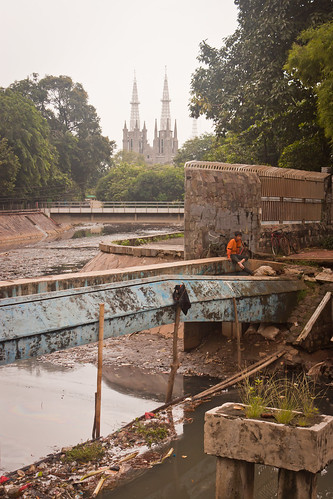 I sat back and regarded her, wondering if she would go home tHassleonight satisfied that she'd done a good days work. A travel agent operating on a bloody archipelago who doesn't have the telephone number of the main ferry company.
I sat back and regarded her, wondering if she would go home tHassleonight satisfied that she'd done a good days work. A travel agent operating on a bloody archipelago who doesn't have the telephone number of the main ferry company.
To her credit she got out a phone book without being asked, and began looking through it, but PELNI wasn't in there. As she sat flicking through the greywhite pages of the book, humming to herself, no doubt wishing that we would disappear so she could get back to fiddling on her phone, Liv appeared at the desk with an open lonely planet guidebook; “PELNI. Telephone number.” She pointed out the details on the page for Jakarta. By Joe she'd done it!
“I don't have any credit.”
“What!?”
“Maybe you can phone them.” she offered.
“You don't have a phone in here?”
She raised her luminous green phone
“But you don't have any credit.” the three of us sort of mumbled together.
We didn't go easy on this girl. We badgered her until she “got some credit”/left the room and walked straight back in again and used the previously un-useable phone to make the calls. The lonely planet guide was an ancient one though, a little under ten years old in fact, and, predictably, all the phone numbers it listed either rang out or were disconnected. Liv and I sat there huddled over the book while the travel agent got back to texting her mate. We discovered that there was one official PELNI ticketing office (or at least, there had been eight years ago), and one other authorised vendor of PELNI tickets. As it so happened that authorised vendor's office was located less than a kilometre away from us, so we drew a hasty map, wrote down the address on a scrap of paper and dashed off up the road.
We really wanted to get these tickets. Sorting this out would mean we could just relax for the next few days and not worry about whether or not we would be able to make it out of the country before our visas ran out. So although it was getting on a bit, and the afternoon had turned that sullen half light that it does before it rains, we marched up the road, across a busy junction, and down a road populated by dull looking office blocks.
After a little searching around we found the address that was written on our scrap of paper. It was a multi-storeyed block of offices painted baby blue and white, and rising to about ten floors. We climbed the concrete steps and pushed open the glass doors and stepped into the lobby, it was tall, but thin, squeezed, and nobody was around except a cleaner pushing a heavy looking featureless metallic box around on a trolley. We showed him the address we had written down, and he ushered us into the gutted remains of a bank where two security guards were sat on red chairs and laughing loudly. We showed them the address we had written down, and the guard said: “Yes, that's here. That's this building.”
“Which floor is it on?”
“Floor 5.” He sounded confident.
We thanked him and got in the elevator. It didn't work. So after a moment hammering at the buttons we got out and waited for another one, then got in, and sailed up to floor 5.
We weren't exactly sure what we were looking for, but as the doors slid open and we were welcomed by large lettering announcing that we were in a University, we were fairly certain that it we were not going to find it here. Nevertheless, the guard had been positive, so we walked out and glanced around. The place was very quiet and slightly dog eared. To our right lay glass doors with peeling lettering that we could see led to some kind of reception area of the university. To our left a long corridor ran in a existentially despairing shade of creamy brown, interspersed with cork boards that had nothing pinned on them. The white tiles on the ceiling were going brown at the edges. A couple dressed in black sat on a bench nearest us. Other than that, it was empty. A long, brown, dog-eared corridor.
None of the doors that lined the corridor were open, but we could see through their port hole windows that there weren't any authorised PELNI ticket vendors inside, they were all either empty, or filled with stacks of tables and chairs. We got to the end of the corridor, looked out of the window at the grey ceiling sky before us, and then turned around and walked back the way we had come. We asked the couple dressed in black if they knew where the PELNI tickets were, and they pointed through the glass doors, stifling a giggle as they did so – perhaps because we were funny looking touris', or perhaps because we were looking for ferry tickets in a university. Probably both.
As we expected the glass doors led to the university reception, but it was populated entirely by cleaners dressed in overalls, except for one sad faced man with an afro, who sat there like he'd been waiting patiently for the last few weeks for a date that never showed. We asked the cleaners for help, and after a few minutes during which nothing was said back to us, and overalled men just shuffled about in front of us, disappearing into and out of a cleaning cupboard, and then whispering to each other, finally a man approached us and said “This is a university.”
I felt insane, but asked anyway: “So we can't buy ferry tickets here?”
There was a pause that went on for as long as a long, brown, dog-eared corridor. Then he said: “No.”
“Do you know where we can find the ferry tickets?”
“PELNI?”
“Yeah!”
“Maybe floor 2.”
“Maybe?”
“Yeah.” then he backed up, and vanished into the cleaning cupboard. We were left in the quiet university reception with the sad faced man with an afro, who hadn't moved or said a thing the whole time.
We left, and went back to the elevator, and decided that the best way to tackle this was to make our way down the floors one by one to see what we could see. The cleaner hadn't exactly sounded confident about floor 2, after all.
Floor 4 was revealed to us in all its splendour. Varnished wooden panelling, polished stone floor, possibly marble, and to our right a heavy double door made from finely carved, dark coloured wood. It looked like the kind of door a CEO, or lord of a castle might burst through angrily to confront a long table of nervous lower downs. We didn't fancy just knocking on it or walking in, so we turned the other way. There lay a short corridor, with grubby white walls and piles of empty cardboard boxes everywhere. There was no door, so we set off down it. To our left the wall was made of glass, and we could see a cleaner walking around inside, but when we called to him he just walked off behind a white panel without looking at us. Through a door a the end of the corridor though we could see into an office. A motorcycle helmet lay on one of the chairs inside so we knew someone must be in. We could see monitors flashing busily within.
“Hello.” we called out, but nobody answered. “Hello!”
After a minute or so it dawned on us that we were wandering around in an empty office that was clearly nothing to do with ferry tickets, so we left, and walked back to the elevator. The heavy wooden lord doors stood just to our right. They were the kind of doors that look like you really shouldn't just go barging in through them (unless you're an angry CEO) but at the same time they are exactly the kind of doors that you cannot refuse an opportunity to barge through. We wandered over, grinning, then turned the handle and barged in.
We were confronted by a dark brown wall that might have been made from varnished wood, and two surprised looking old men in suits stood behind a varnished wooden stand. Recovering quickly from their surprise they shot us a question in Indonesian, we didn't understand but their angry eyes translated it as something like “What the hell are you doing here?”
We put on our best lost-touris faces, and showed them our piece of paper with the address on it.
They took it and looked at it together. “PELNI office.” One said in slow but careful English.
“Yes.”
He pointed down the corridor, the one we had just walked down with the motorcycle helmet and flashing monitors. “But.” he added, “Closed.”
The other man shook his head and said “No.”
We paused, taking this in, and then pointed back down the corridor to check, “PELNI?”
“Yes.”
“Closed?”
“Yes.”
“Thank you.”
It seemed like we would have to come back the next day, but something made us doubt what the man had said. A combination of the fact that the office didn't look like it had anything to do with ferries (but what does a ferry ticket office look like anyway?) and the fact that his colleague had lain seeds of doubt in our minds by shouted “no” at us for no apparent reason half way through the conversation. We decided to investigate, to make sure it was the right place and to save ourselves an unnecessary trip back the next day. It was lucky we did so.
As we walked towards the open office door again the carved wooden doors opened behind us and the man came out shouting “No! Closed! No!”
We persisted, acknowledging him but still peering in through the door and trying to get some clue about the purpose of the office. The man came briskly over to us, and then said, rather apologetically “No.”
“Yes, we're just checking.”
“No. No PELNI.”
“This isn't the PELNI office?”
He shook his head sadly, as if we'd just beaten a secret out of him.
We returned to the elevator, and went down to floor 3, doubt burrowing around our minds like hungry moles. The doors slid open, and we were confronted by a multitude of signs. Thin black labels pointing either left or right with white writing on them, none of which we understood. There was blue carpet to our left, and that looked nicer than the grey door that lay to our right so we walked down the corridor until we came to a glass door with another small reception area inside. We walked in, said hello, and the receptionist walked off. This was something we were used to by now, and we waited a moment until four people returned, bade us sit down, and one of them began to speak to us.
“Hello my friends, can I help you?” his English was near fluent.
“Ah, yes. We're looking for the PELNI ticketing office.”
“Ah, the PELNI office.” He considered this for a moment, while the three men around him repeated the acronym, like the Knights who say Ni.
“It was here.”
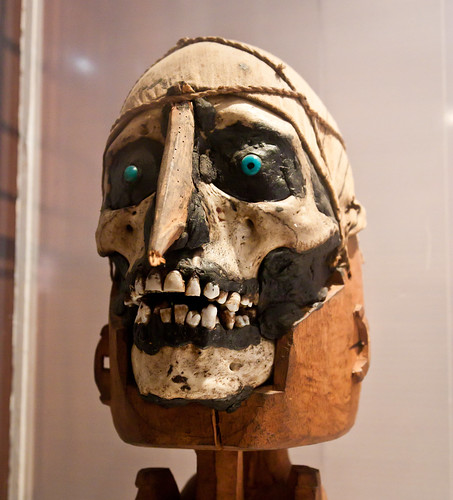 |
| A human skull used to communicate with the dead in Papua New Guinea. When we spoke to it it wailed 'Beware the ferry tickets!' |
“Was?”
“But it isn't anymore.”
It is perhaps unsurprising that we were enormously relived at the news. It meant that we had a very good reason to leave this strange, despairing place at last, content that we'd at least given it a good go. We would try the other office, the main PELNI office the next day. Just let us get out of this building!
“You should speak to the building manager. I do not know where the PELNI office moved to, but he may know.”
“Oh, really(?)” we said, unenthused.
“His name is Mr Marradinsadalay. You will find him in the basement.”
“Thank you very much. Thank you.” we shook his hand, eager to leave, but indebted to this man who had lifted the curse and freed us. We had no intention at all of going into the basement to look for a building manager. Yes. Exactly. What kind of building manager lives in the basement? One driven insane after years of roaming the desolate, strange and lonely corridors of this building probably. Legend has it he first came to the building looking to purchase a sandwich.
We fled to the elevator, and descended back to the ground floor. The lobby was completely silent now, the guards were nowhere to be seen, and the man with the featureless metallic box had vanished also. It was growing dark outside, and we hurried back up the road, back to our hostel, and vowed never to go into random Indonesian office blocks again.
The next day we came to a random Indonesian office block that said PELNI outside. But you know what? We walked in, we chatted to the people working in there, and we bought two economy class tickets for a ferry leaving to Bintan on Tuesday the 10th of January. Easy peasy.
The rest of our stay in Jakarta was, on the whole, relaxing and enjoyable. Bed bugs made an unwelcome appearance during our second night, so we had to switch rooms but neither of us were convinced that this would solve the problem, so we went to the market and bought 2 x 2m lengths of silk sheets to test the theory that silk repels bedbugs. The silk was not cheap at $60, but we slept undisturbed the next night, although whether that was because of the silk, or whether it was because there were no bugs in our new room, we do not know. Either way, we slept well, and now have two sexy dark green bed sheets.
In other news, after being prompted to re-evaluate my load during our struggle up the hills around Prigi I decided to jettison some weight, so I gave my down sleeping bag and hoodie to Moonay, who was elated. Chucking a decent down sleeping bag wasn't an easy decision, but it is useless in Indonesia, and I can't imagine us coming into any seriously cold climates for months – perhaps not until China (and we might not even make it that far), and whenever we do come up against colder conditions we should have plenty of warning so I can just buy a bunch of woolly blankets and use them. I hope. So, I've knocked a massive bulk out of my bags, and saved on a few kilos. Lets just hope Malaysia doesn't have any secret snowy mountain passes to catch us out.
The days ticked lazily by. We fell into line with our daily budgets. We discovered that there are indeed a hell of a lot of mosquitoes in Jakarta. Before we knew it, it was time to leave. The pannier went back on the racks, and at around 4pm we kicked off down the road towards Jakarta's port, Tanjung Priok. The route there was pretty grim, cycling along busy roads, sloshing with brown water that stank of human waste. Cranes came into view, then heaped piles of shipping containers, and we found ourselves cycling by grey sea water, and past large gates leading to industrial docks, with long flat ships bobbing under the shadow of towering metal scaffolds.
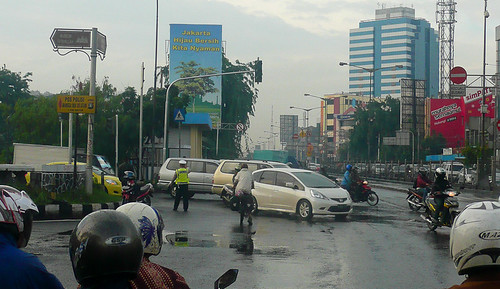 |
| Liv takes the traffic head on leaving Jakarta. |
Our dock was a little further along, and after a bit of asking around we finally came to what seemed to be the right place. It was a long, wide building with a corrugated tin roof painted a dull cream colour. There were no signs anywhere, just a few smoked glass doors, and a hundred or so people lying around outside, some of them hawking goods, but most of them waiting for a boat. Our ferry was due to leave at 8pm, and after asking at the information office we were escorted inside the building, that consisted of two linked waiting areas about the size of small aircraft hangers. One side was packed with people of all ages lying on white plastic sheets with various bags and boxes. The other half was completely empty but for rows of plastic seats and a huge glass wall that looked out onto an empty space at the dock, where we assumed our ship would arrive. We slunk off to the empty half, leaned our bikes against the wall, and got our books out to settle down for a long wait. Our ferry that was due to leave in about 3 hours hadn't even arrived yet. The information office told us it might arrive at 9pm, but then the security guard who escorted us in said it may not arrive until midnight. An hour later that time was revised to 2am.
10th - 12th January 2012, A ferry to Bintan
Tanjung Priok, Jakarta – Kijang, Bintan
Approximate distance: 900km
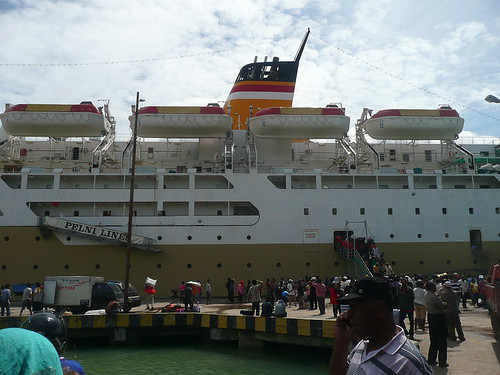 |
| The ferry in daylight |
“Security office will store your bicycles.” The PELNI office had told us three days ago.
 We found the security office, and a man there led us down a busy corridor to a metal railing. He pointed at it, as though locking two fully laden bicycles to a railing in the middle of a busy walkway was secure. We explained that we weren't going to leave all our bags out in the open for the next 30 hours, where anybody could just walk over and start rummaging through them, but he just shrugged. Luckily for us another man had appeared, with a kindly face, grey hair and dressed in the ship's overalls. When this blog gets made into a film he will be played by Morgan Freeman. He led us up a flight of stairs (again, not easy with two bicycles), through a locked door and into another sleeping area that was evidently out of use, perhaps because the beds were being cleaned, or perhaps because there weren't enough passengers to warrant opening it – cheap air travel has taken its toll on the ferry operators in Indonesia, with many less popular routes being closed due to loss of numbers - taking the ferry takes much longer than flying, and is often the same price, or even more expensive.
We found the security office, and a man there led us down a busy corridor to a metal railing. He pointed at it, as though locking two fully laden bicycles to a railing in the middle of a busy walkway was secure. We explained that we weren't going to leave all our bags out in the open for the next 30 hours, where anybody could just walk over and start rummaging through them, but he just shrugged. Luckily for us another man had appeared, with a kindly face, grey hair and dressed in the ship's overalls. When this blog gets made into a film he will be played by Morgan Freeman. He led us up a flight of stairs (again, not easy with two bicycles), through a locked door and into another sleeping area that was evidently out of use, perhaps because the beds were being cleaned, or perhaps because there weren't enough passengers to warrant opening it – cheap air travel has taken its toll on the ferry operators in Indonesia, with many less popular routes being closed due to loss of numbers - taking the ferry takes much longer than flying, and is often the same price, or even more expensive.A little further down the room we came to some barred metal doors that opened into a cupboard sized room. It looked like the ship's jail, perfect! We pushed our bikes inside and the guy locked them up for us. We descended back down the stairs to the long wide economy class rooms. They were packed with row after row of mattresses on raised wooden platforms, and filled with the sounds of hundreds of people getting ready for the long haul. Cockroaches scuttled up the walls, while empty plastic bottles rattled around on the floor amid dark, sticky stains. Although it was bustling and loud, it was clear that there was going to plenty of space for us to sleep. Our designated spaces were taken by a bunch of young lads, but in the next row we found two free mattresses side by side and got ourselves settled.
We spent 30 hours on the ferry, and once we were used to the set-up it turned out to be a fairly pleasant experience. The lights never go off, even at night, and it isn't quiet – mobile phones blared crap nintendo music during the day, and babies howled through the night (and most of the day too actually, but the mobile phones tended to blare them out a bit). But bring along some earplugs and a good book, sit back, and enjoy long lazy hours with the gentle rocking of the ship, and it really isn't so bad. Not bad for only $25 a head anyway. The on-board meals left a little to be desired though. Rice and cabbage for lunch. Rice and a fish head for dinner. We were prepared for this though, and had brought containers full of delicious Indian samosas and curries from a restaurant in Jakarta.
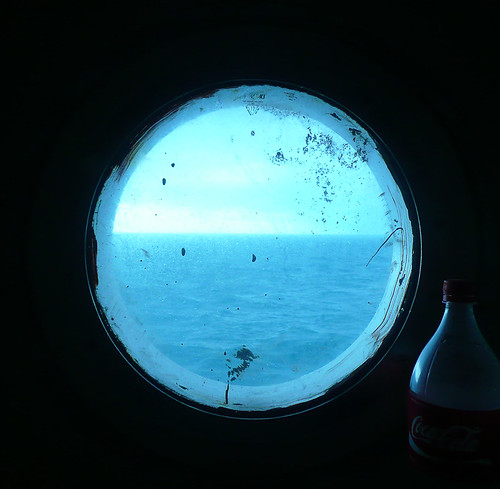
After two nights on board - the morning of the 12th - we packed up our bags and headed up on deck to watch our arrival in Bintan. The sea was calm, and dotted with dozens of forested islands that our vessel gently veered around, picking its way to the port at Kijang in Bintan. As we came closer, wooden huts sprang up along the water, with fishing boats moored outside, bobbing sedately while others chugged to and fro in the water below us. The buildings multiplied, and a few crept up to four of five stories, but the town as a whole as it appeared was small and unimposing. There were a small rabble of touts offering us buses and taxis, and asking us where we were from as we rolled our bikes down the ramp and off the ship at about 10am, but we soon walked away from any hassle, put on some sun cream, and set off up the road. Malaysia was only a 90 minute ferry ride away – and this time we knew that multiple ferries ran every single day – but we still had about a week left on our visa, and we had an island to explore.
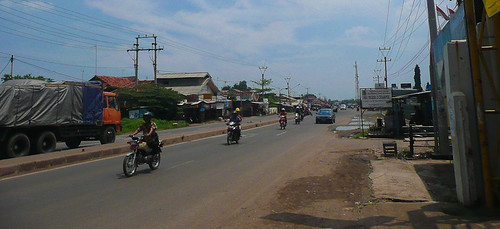
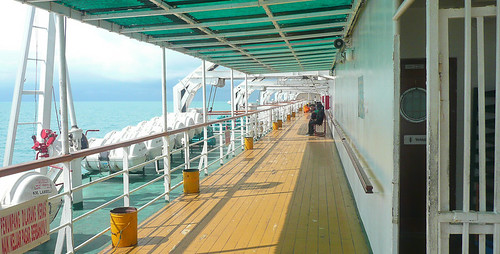
Fantastic blog. Really interesting - and scary! Loved the story about the travel agents and the ferry tickets. Indonesia is meant to be one of the newly advanced developing countries (along with Brazil and China). Sounds like they've still a long way to go!
ReplyDeleteKeep up with the blog!
C.